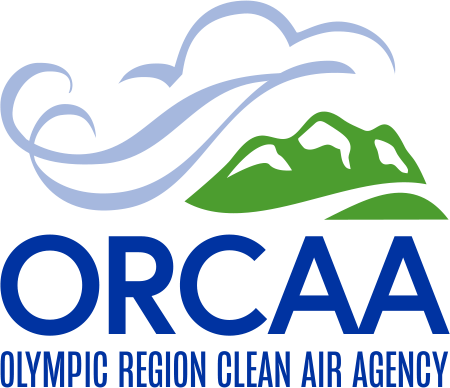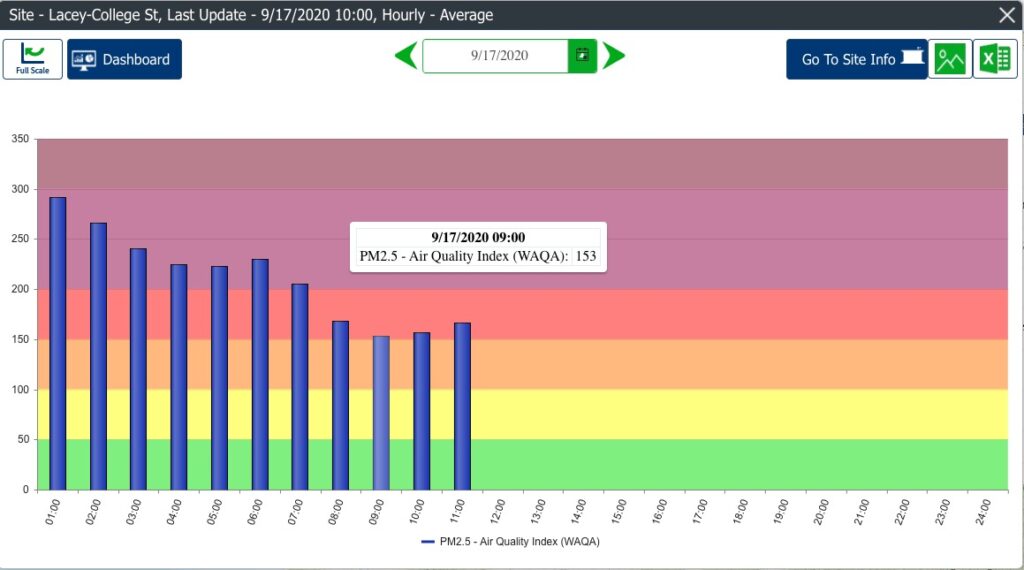
Many residents along the western parts of ORCAA’s jurisdiction awoke Thursday to cleaner air. Air quality monitoring stations in Grays Harbor, Mason, and Pacific Counties showed substantial reductions – into the “green” range at times – in fine particulate matter (PM2.5) pollution overnight. But some of those stations later showed numbers bouncing back up. The rest of ORCAA’s jurisdiction saw pollution levels drop from Very Unhealthy (Purple) to Unhealthy (red) and even Unhealthy for Sensitive Groups (orange). Those levels are better than reported previously but still of great concern.
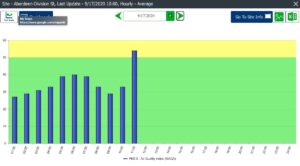
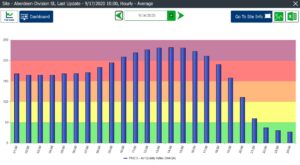 The National Weather Service (NWS) expects a marine system to push into the state for the next few days. That system will eventually clear out most if not all the wildfire smoke that blankets us. But it will take time, and it’s impossible to predict exactly when any specific area will be clear. That’s in large part because that weather system that’s pushing in has a large, multi-layer plume of smoke in front of it. So as the marine winds sweep into western Washington, they are pushing more smoke before them. Some of that smoke is near ground level, while other bands are hovering at higher altitudes. Higher-level smoke and gaps in the plume allow air pollution numbers at ground level to drop, but when the lower bands hit, the numbers spike back up.
The National Weather Service (NWS) expects a marine system to push into the state for the next few days. That system will eventually clear out most if not all the wildfire smoke that blankets us. But it will take time, and it’s impossible to predict exactly when any specific area will be clear. That’s in large part because that weather system that’s pushing in has a large, multi-layer plume of smoke in front of it. So as the marine winds sweep into western Washington, they are pushing more smoke before them. Some of that smoke is near ground level, while other bands are hovering at higher altitudes. Higher-level smoke and gaps in the plume allow air pollution numbers at ground level to drop, but when the lower bands hit, the numbers spike back up.
The NWS allowed an Air Quality Advisory for Pacific, Grays Harbor, and Clallam Counties to end as of noon Thursday. But that advisory was extended through Friday for Thurston, Mason, and eastern Jefferson Counties.
While the smoke lingers, residents should continue to take action to minimize the health impacts of that smoke. The Washington Department of Health (DOH) offers detailed information on how residents can best deal with wildfire smoke impacts. That information can be found here.
What can I do to protect myself and my family from outdoor smoke?
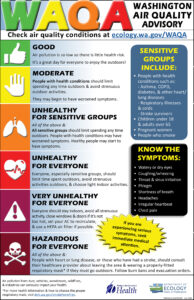 CURTAIL ALL BURNING! To reduce smoke, avoid creating any fires, including recreational fires. Every county of the state has some level of the fire-safety burn ban and most ban all forms of outdoor burning, including recreational fires. But even where legal, recreational fires should NOT be ignited until fire and air quality conditions improve.
CURTAIL ALL BURNING! To reduce smoke, avoid creating any fires, including recreational fires. Every county of the state has some level of the fire-safety burn ban and most ban all forms of outdoor burning, including recreational fires. But even where legal, recreational fires should NOT be ignited until fire and air quality conditions improve.- Check local air quality reports and listen to news or health warnings for your community.
- Avoid physical exertion outdoors if smoke is in the air.
- If you have asthma or other lung diseases, make sure you follow your doctor’s directions about taking your medicines and follow your asthma management plan. Call your health care provider if your symptoms worsen.
- Stay indoors and keep indoor air as clean as possible. Take the following steps when indoors:
- Keep windows and doors closed. Track the air quality and open your windows for fresh air when the air quality improves. Pay attention to the heat indoors and follow the guidance in the section below if it’s too hot.
- Run an air conditioner, set it to re-circulate, and close the fresh-air intake. Make sure to change the filter regularly.
- Use an air cleaner with a high-efficiency particulate air (HEPA) filter to reduce indoor air pollution. A HEPA filter will reduce the number of irritating fine particles in indoor air. A HEPA filter with charcoal will help remove some of the gases from the smoke. Do not use an air cleaner that produces ozone. See California’s guide to indoor air devices: https://ww2.arb.ca.gov/resources/fact-sheets/air-cleaning-devices-home.
- Don’t add to indoor pollution. Don’t use food broilers, candles, incense, fireplaces, or gas stoves. Don’t vacuum unless your vacuum has a HEPA filter, because vacuuming stirs up particles already inside your home. Don’t smoke, because smoking puts even more pollution into the air.
- Consider leaving the area if the air quality is poor and it’s not possible to keep indoor air clean, especially if you or those you are caring for are having health problems or are in a sensitive group.
Washington’s complete network of Air Monitoring Stations — including those managed and maintained by ORCAA — and the direct impacts of wildfire smoke can be found here: https://fire.airnow.gov/
Additional information on wildfires and smoke from wildfires is available at http://wasmoke.blogspot.com/
ORCAA will continue to monitor this possible smoke event and will report any changes of note.
